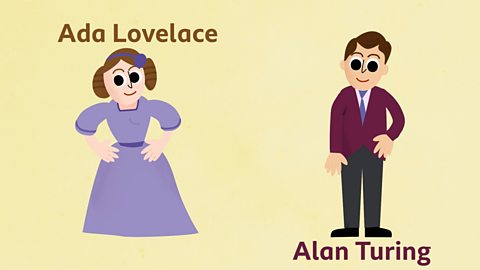Narrator:
Britain has certainly had a lot of kings and queens.But not many have reigned for so long, while the country changed so much, as Queen ElizabethThe first and the second.
Both, of course, started out as princesses.And neither of them ever expected to become a queen. But both felt the weight of a heavy royal crown on their heads when they were still quite young.
They might have had the same title.'Her Majesty, the Queen!ÔÇÖBut really, they had very different jobs to do.
Elizabeth I became the Queen of England, Wales, and Ireland, in the year 1558.
By the time it was the next ElizabethÔÇÖs turn, 394 years later, things had changed a lot. She became the Queen of the United Kingdom and the Head of the Commonwealth, made up of a group of countries all over the world!
The kingdom might have got a lot bigger, but in modern Britain, the people elect a Parliament to decide what happens. So the Queen, or King, doesnÔÇÖt actually make the rules.
Elizabeth I, though, had to really be The Boss. Of everyone ÔÇô even the army and the navy!But she turned out to be rather good at making big decisions.
At a time when thereÔÇÖd been a lot of fighting, both in the country, and with its neighbours, she calmed things down, and made peace.
But she always made sure that the country had a strong navy. Her ships saw off an invasion by the Spanish.
'Son demasiados! Ahh! Retirada!'
And started sailing all around the globe.
Not being at war meant that people could get on with making and selling things, and the country became richer.
The Queen encouraged art ÔÇô painting, music, and the theatre, where the new plays by William Shakespeare were particularly popular.
So, Britain changed a lot during Elizabeth IÔÇÖs time.
But for a reign when the nation became a really different kind of place, the prize has to go to Elizabeth II!
She took the throne when Britain was having a hard time recovering from World War Two.But as her reign went on, she was kept busy opening all the new things that were being built ÔÇô homes, roads, factories, schools, hospitals!
And new inventions kept changing the way people lived.Like television, for example. At the time of the QueenÔÇÖs coronation, only a few people had TVs, but over the years, more and more people could watch their monarch giving a speech!
ÔÇÿHardly anybody ever got to see me!ÔÇÖ
The nation kept changing, as people from Commonwealth countries came to live and work in the UK, and young people invented new music and new ways of dressing.
And the longer the QueenÔÇÖs reign lasted, the faster things started changing ÔÇô with computers, mobile phones, and the internet meaning that people could start communicating in whole new ways.
The two queens may have lived in very different times, but both became famous for the length of their reigns. Elizabeth II, in fact, became the longest serving monarch in British history.
So long reigns, peace, and prosperity, perhaps the most successful Monarchs ever? Ladies and gentlemen, the Elizabeths!
Video summary
This animated film compares the lives and different time periods of two of the most famous British monarchs of all time, Queen Elizabeth I and Queen Elizabeth II.
Elizabeth I ruled over England, Wales, and Ireland from 1558 until her death in 1603. She successfully navigated political turmoil, promoted the arts, and ensured a powerful navy.
Centuries later, Elizabeth II witnessed the rapid changes of the 20th and 21st centuries as the Queen of the United Kingdom and Head of the Commonwealth, embracing new technologies and cultural shifts.
Both Elizabeths left a lasting legacy, becoming known for their long reigns and their promotion of peace and prosperity.
Teacher Notes
Themes in the film include:
- Monarchy and government
- Technological advances
- Changes to a nation within living memory, including through immigration
Additional Notes
- ÔÇ£Neither expected to be QueenÔÇØ
Elizabeth I was third in line when her father, Henry VIII, died and men were always prioritised in the line of succession over their sisters. There hadnÔÇÖt been many reigning queens before Elizabeth I - Lady Jane Grey ruled for just nine days - followed by Mary I, Elizabeth's sister, who is considered the first reigning Queen of England. As Elizabeth IÔÇÖs younger brother and older sister died without children, she took the throne.
In the case of Elizabeth II, her uncle (Edward VIII) was king but he voluntarily abdicated after less than a year, leaving the throne to his younger brother (ElizabethÔÇÖs father - George VI) and Elizabeth became the heir.
- The Commonwealth
The Commonwealth is a group of countries created from former territories of the British Empire. In the film we see the founding members in 1952, when Elizabeth II came to power, however membership has changed since and continues to do so, even in modern times. For an up-to-date map, you can view the .
The Commonwealth has shaped modern Britain, especially through immigration. After World War Two, the government encouraged immigration from Commonwealth countries, including the Windrush generation.
- The United Kingdom
Elizabeth I was called the Queen of England and Ireland. By Elizabeth IIÔÇÖs time, Ireland had become a republic and she became Queen of the United Kingdom (England, Wales, Scotland and Northern Ireland).
Elizabeth I didnÔÇÖt rule over Scotland, which had its own separate royal line at the time. It was only upon Elizabeth IÔÇÖs death, when the throne passed to a Scottish king, that this changed.
Before the video
Before the video, establish what pupils already know about monarchy:
- What does a king or queen do?
- Who is the monarch at the moment?
- Can you name any other kings or queens?
Show a portrait of Elizabeth I and a photograph of Elizabeth II:
- Do you know who these queens are?
- Do you know anything about them that was the same? Or different?
Explain three bits of key vocabulary theyÔÇÖll be hearing:
- Reign
- Monarch
- Parliament
During the video
00:30 - What did they both start out as, before they were Queen? (Both were princesses)
00:50 - Who was queen first? (Elizabeth I)
01:12 - In modern times, who makes all the decisions? (The parliament, not the king or queen)
01:47 - What did Elizabeth I always want the country to have? (A strong navy, lots of ships that could fend off invasions and travel the globe)
02:41 - When Elizabeth II was crowned, what did very few people have? (Television)
02:55 - People came from overseas to live in the UK. Where did they come from? (The commonwealth, a group of countries all over the world)
After the video
- How were the two Elizabeths similar? How were they different?
- What jobs did the queens have?
- How did technology change during Elizabeth II's reign?
Show a clip or a black and white photograph of Elizabeth IIÔÇÖs coronation and explain that it was the first British coronation ever shown on television.
- We know what Queen Elizabeth II looked like as we have a lot of photographs and film. But how do we know what Queen Elizabeth I looked like?
- Why do you think having a long reign might be special or important?
- What are some challenges of being a queen for a very long time?
Place three images next to each other:
- A painting of Elizabeth I
- A black and white coronation photograph of Elizabeth II
- A colour photograph of Elizabeth II
Ask them to put them in chronological order.- How is a painting different from a photograph?
This film is suitable for teaching History at KS1 in England, Wales and Northern Ireland and 1st Level in Scotland.
More from this series:
Emily Davison and Rosa Parks. video
This animated film compares the lives of Emily Davison and Rosa Parks, two activists from different times and places, who both successfully protested against unfair rules.
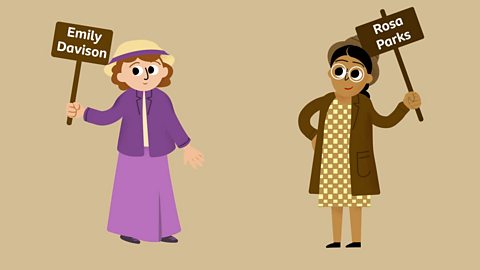
Neil Armstrong and Matthew Henson. video
This animated film compares the lives and adventures of two different explorers, Neil Armstrong and Matthew Henson.
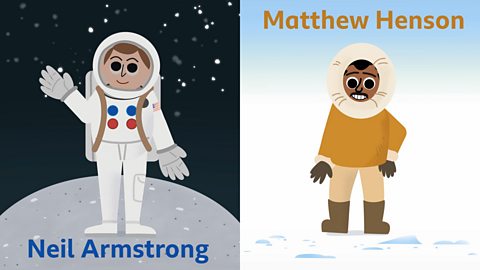
Vincent Van Gogh and Frida Kahlo. video
This animated film compares the lives of Vincent Van Gogh and Frida Kahlo, two famous artists from different time periods, who both found passion and purpose through their unique painting styles.
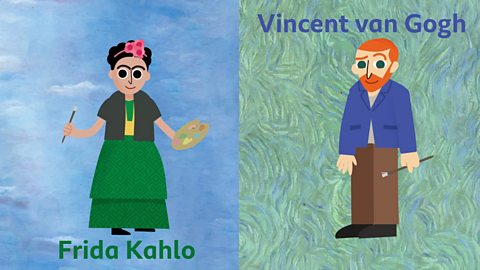
William Caxton and Sir Tim Berners-Lee. video
This animated film looks at the big ideas of William Caxton and Sir Tim Berners-Lee. Both changed how we share information today, even though they lived over 500 years apart.
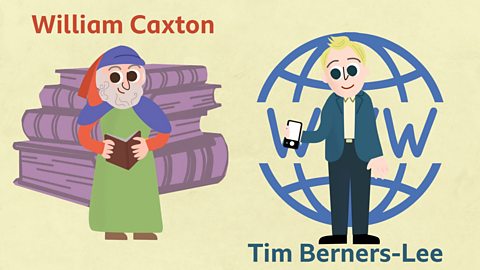
Ada Lovelace and Alan Turing. video
This animated film compares the lives of Ada Lovelace and Alan Turing, two mathematicians from different eras whose bold and creative ideas helped develop the first computers.
